келер шақ
келер шақ
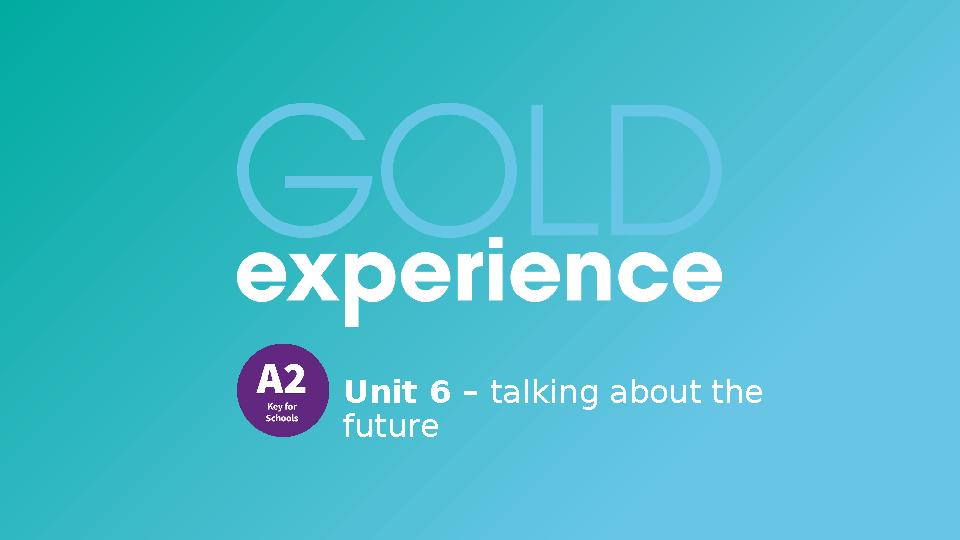

#1 слайд
Unit 6 – talking about the
future
1 слайд
Unit 6 – talking about the future
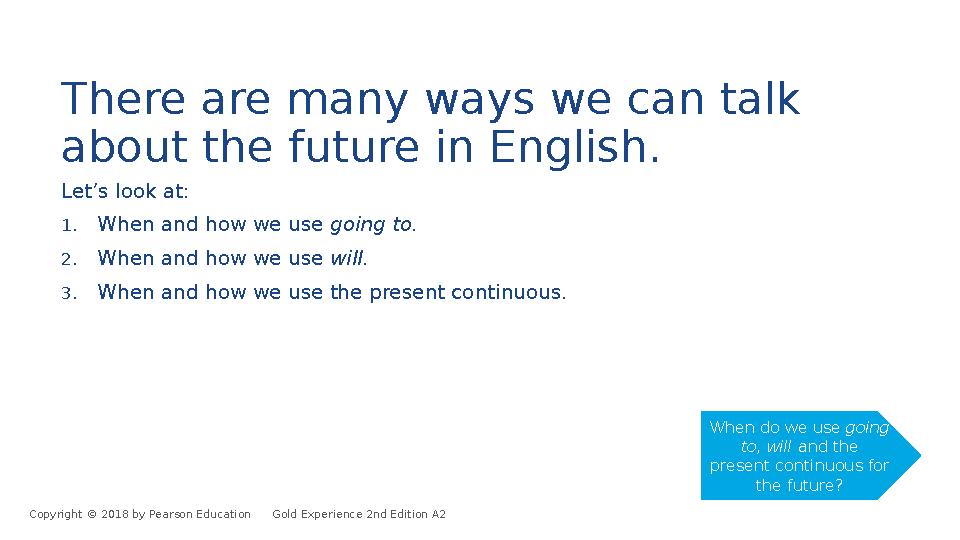
#2 слайд
There are many ways we can talk
about the future in English.
Let’s look at:
1.When and how we use going to.
2.When and how we use will.
3.When and how we use the present continuous.
When do we use going
to, will and the
present continuous for
the future?
Copyright © 2018 by Pearson Education Gold Experience 2nd Edition A2
2 слайд
There are many ways we can talk about the future in English. Let’s look at: 1.When and how we use going to. 2.When and how we use will. 3.When and how we use the present continuous. When do we use going to, will and the present continuous for the future? Copyright © 2018 by Pearson Education Gold Experience 2nd Edition A2
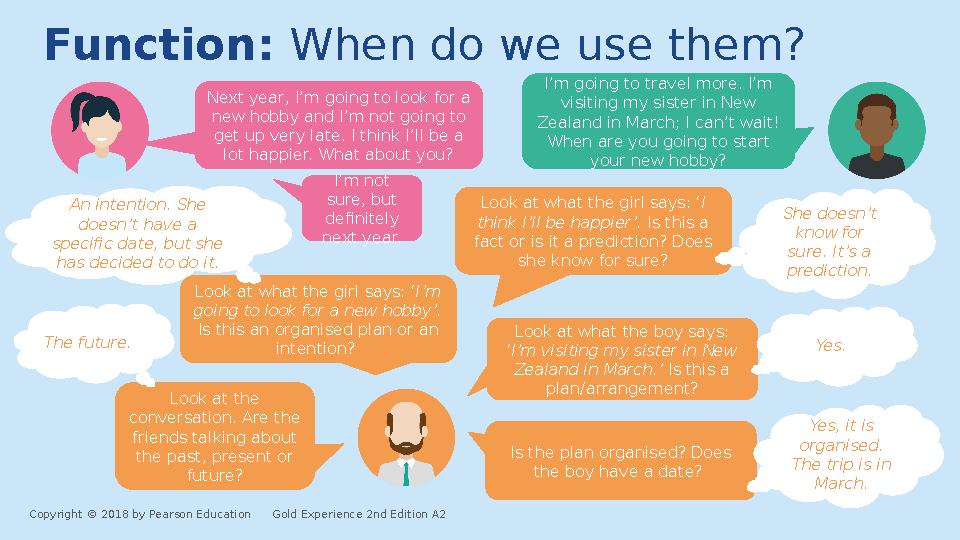
#3 слайд
Function: When do we use them?
Next year, I’m going to look for a
new hobby and I’m not going to
get up very late. I think I’ll be a
lot happier. What about you?
I’m going to travel more. I’m
visiting my sister in New
Zealand in March; I can’t wait!
When are you going to start
your new hobby?
Look at the
conversation. Are the
friends talking about
the past, present or
future?
The future.
Look at what the girl says: ‘I’m
going to look for a new hobby’.
Is this an organised plan or an
intention?
An intention. She
doesn’t have a
specific date, but she
has decided to do it.
Look at what the girl says: ‘I
think I’ll be happier’. Is this a
fact or is it a prediction? Does
she know for sure?
She doesn’t
know for
sure. It’s a
prediction.
Look at what the boy says:
‘I’m visiting my sister in New
Zealand in March.’ Is this a
plan/arrangement?
Yes.
Is the plan organised? Does
the boy have a date?
Yes, it is
organised.
The trip is in
March.
I’m not
sure, but
definitely
next year.
Copyright © 2018 by Pearson Education Gold Experience 2nd Edition A2
3 слайд
Function: When do we use them? Next year, I’m going to look for a new hobby and I’m not going to get up very late. I think I’ll be a lot happier. What about you? I’m going to travel more. I’m visiting my sister in New Zealand in March; I can’t wait! When are you going to start your new hobby? Look at the conversation. Are the friends talking about the past, present or future? The future. Look at what the girl says: ‘I’m going to look for a new hobby’. Is this an organised plan or an intention? An intention. She doesn’t have a specific date, but she has decided to do it. Look at what the girl says: ‘I think I’ll be happier’. Is this a fact or is it a prediction? Does she know for sure? She doesn’t know for sure. It’s a prediction. Look at what the boy says: ‘I’m visiting my sister in New Zealand in March.’ Is this a plan/arrangement? Yes. Is the plan organised? Does the boy have a date? Yes, it is organised. The trip is in March. I’m not sure, but definitely next year. Copyright © 2018 by Pearson Education Gold Experience 2nd Edition A2
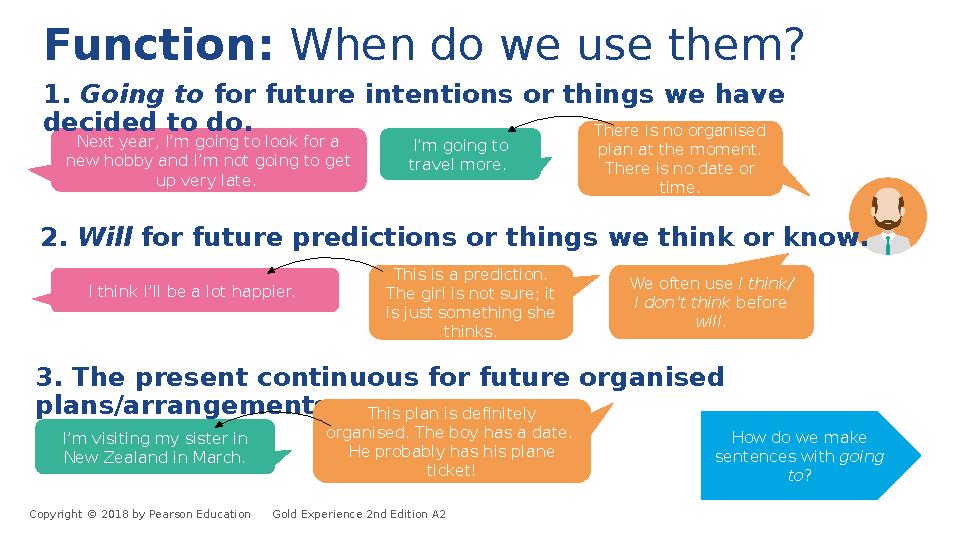
#4 слайд
Function: When do we use them?
Next year, I’m going to look for a
new hobby and I’m not going to get
up very late.
I’m going to
travel more.
1. Going to for future intentions or things we have
decided to do.
There is no organised
plan at the moment.
There is no date or
time.
2. Will for future predictions or things we think or know.
I think I’ll be a lot happier.
This is a prediction.
The girl is not sure; it
is just something she
thinks.
We often use I think/
I don’t think before
will.
3. The present continuous for future organised
plans/arrangements.
I’m visiting my sister in
New Zealand in March.
This plan is definitely
organised. The boy has a date.
He probably has his plane
ticket!
How do we make
sentences with going
to?
Copyright © 2018 by Pearson Education Gold Experience 2nd Edition A2
4 слайд
Function: When do we use them? Next year, I’m going to look for a new hobby and I’m not going to get up very late. I’m going to travel more. 1. Going to for future intentions or things we have decided to do. There is no organised plan at the moment. There is no date or time. 2. Will for future predictions or things we think or know. I think I’ll be a lot happier. This is a prediction. The girl is not sure; it is just something she thinks. We often use I think/ I don’t think before will. 3. The present continuous for future organised plans/arrangements. I’m visiting my sister in New Zealand in March. This plan is definitely organised. The boy has a date. He probably has his plane ticket! How do we make sentences with going to? Copyright © 2018 by Pearson Education Gold Experience 2nd Edition A2
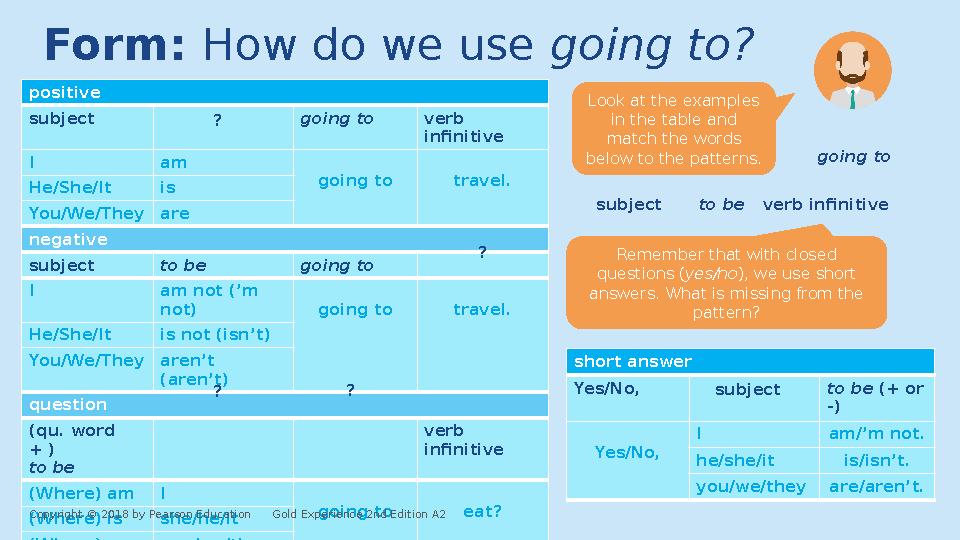
#5 слайд
Form: How do we use going to?
positive
subject going to verb
infinitive
I am
going to travel.
He/She/It is
You/We/They are
negative
subject to be going to
I am not (’m
not) going to travel.
He/She/It is not (isn’t)
You/We/They aren’t
(aren’t)
question
(qu. word
+ )
to be
verb
infinitive
(Where) am I
going to eat?
(Where) is she/he/it
(Where) are you/we/they
Look at the examples
in the table and
match the words
below to the patterns.
to besubject verb infinitive
going to
?
?
? ?
short answer
Yes/No, to be (+ or
-)
Yes/No,
I am/’m not.
he/she/it is/isn’t.
you/we/they are/aren’t.
Remember that with closed
questions (yes/no), we use short
answers. What is missing from the
pattern?
subject
Copyright © 2018 by Pearson Education Gold Experience 2nd Edition A2
5 слайд
Form: How do we use going to? positive subject going to verb infinitive I am going to travel. He/She/It is You/We/They are negative subject to be going to I am not (’m not) going to travel. He/She/It is not (isn’t) You/We/They aren’t (aren’t) question (qu. word + ) to be verb infinitive (Where) am I going to eat? (Where) is she/he/it (Where) are you/we/they Look at the examples in the table and match the words below to the patterns. to besubject verb infinitive going to ? ? ? ? short answer Yes/No, to be (+ or -) Yes/No, I am/’m not. he/she/it is/isn’t. you/we/they are/aren’t. Remember that with closed questions (yes/no), we use short answers. What is missing from the pattern? subject Copyright © 2018 by Pearson Education Gold Experience 2nd Edition A2
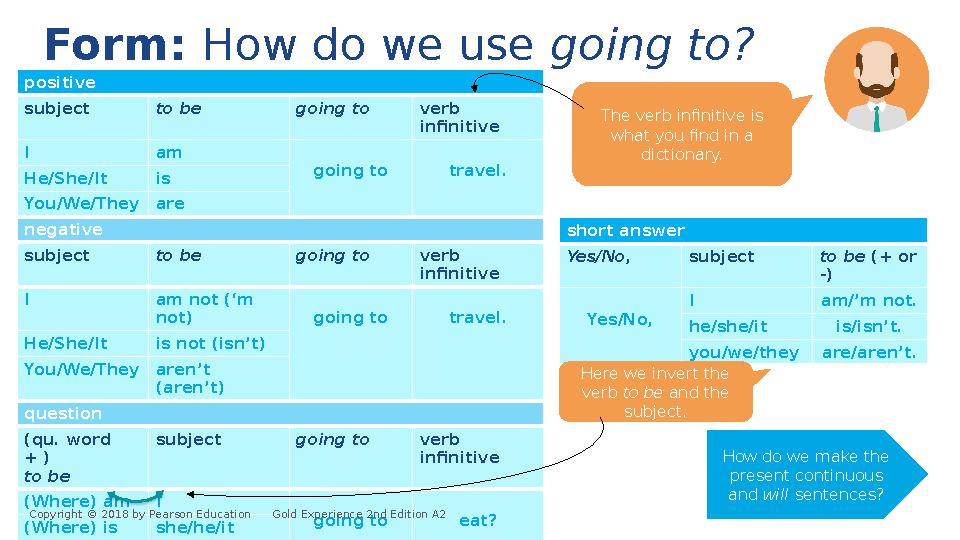
#6 слайд
Form: How do we use going to?
positive
subject to be going to verb
infinitive
I am
going to travel.
He/She/It is
You/We/They are
negative
subject to be going to verb
infinitive
I am not (‘m
not) going to travel.
He/She/It is not (isn’t)
You/We/They aren’t
(aren’t)
question
(qu. word
+ )
to be
subject going to verb
infinitive
(Where) am I
going to eat?
(Where) is she/he/it
(Where) are you/we/they
The verb infinitive is
what you find in a
dictionary.
short answer
Yes/No, subject to be (+ or
-)
Yes/No,
I am/’m not.
he/she/it is/isn’t.
you/we/they are/aren’t.
Here we invert the
verb to be and the
subject.
How do we make the
present continuous
and will sentences?
Copyright © 2018 by Pearson Education Gold Experience 2nd Edition A2
6 слайд
Form: How do we use going to? positive subject to be going to verb infinitive I am going to travel. He/She/It is You/We/They are negative subject to be going to verb infinitive I am not (‘m not) going to travel. He/She/It is not (isn’t) You/We/They aren’t (aren’t) question (qu. word + ) to be subject going to verb infinitive (Where) am I going to eat? (Where) is she/he/it (Where) are you/we/they The verb infinitive is what you find in a dictionary. short answer Yes/No, subject to be (+ or -) Yes/No, I am/’m not. he/she/it is/isn’t. you/we/they are/aren’t. Here we invert the verb to be and the subject. How do we make the present continuous and will sentences? Copyright © 2018 by Pearson Education Gold Experience 2nd Edition A2
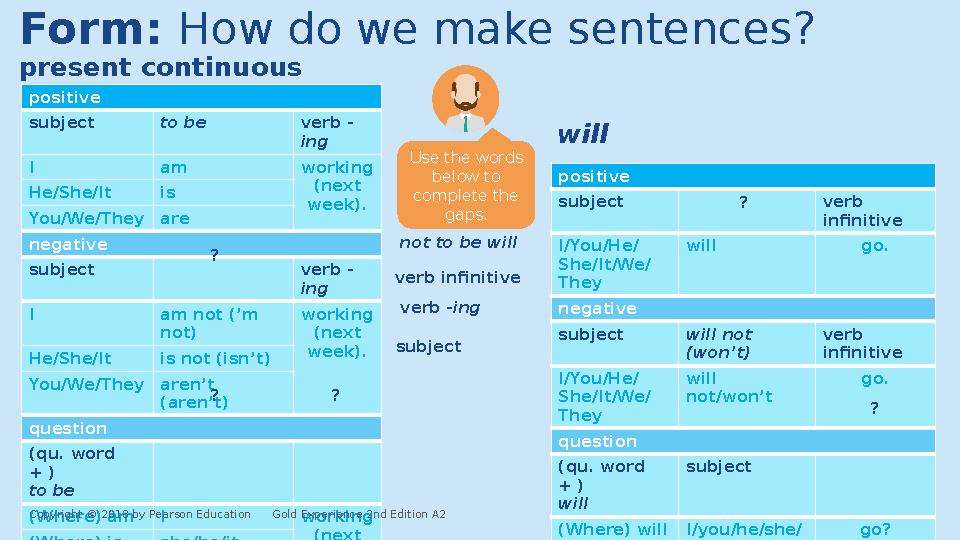
#7 слайд
Form: How do we make sentences?
positive
subject to be verb -
ing
I am working
(next
week).
He/She/It is
You/We/They are
negative
subject verb -
ing
I am not (’m
not)
working
(next
week).
He/She/It is not (isn’t)
You/We/They aren’t
(aren’t)
question
(qu. word
+ )
to be
(Where) am I working
(next
week)?
(Where) is she/he/it
(Where) are you/we/they
present continuous
will
positive
subject verb
infinitive
I/You/He/
She/It/We/
They
will go.
negative
subject will not
(won’t)
verb
infinitive
I/You/He/
She/It/We/
They
will
not/won’t
go.
question
(qu. word
+ )
will
subject
(Where) will I/you/he/she/
it/we/they
go?
Use the words
below to
complete the
gaps.
not to bewill
verb infinitive
verb -ing
subject
?
? ?
?
?
Copyright © 2018 by Pearson Education Gold Experience 2nd Edition A2
7 слайд
Form: How do we make sentences? positive subject to be verb - ing I am working (next week). He/She/It is You/We/They are negative subject verb - ing I am not (’m not) working (next week). He/She/It is not (isn’t) You/We/They aren’t (aren’t) question (qu. word + ) to be (Where) am I working (next week)? (Where) is she/he/it (Where) are you/we/they present continuous will positive subject verb infinitive I/You/He/ She/It/We/ They will go. negative subject will not (won’t) verb infinitive I/You/He/ She/It/We/ They will not/won’t go. question (qu. word + ) will subject (Where) will I/you/he/she/ it/we/they go? Use the words below to complete the gaps. not to bewill verb infinitive verb -ing subject ? ? ? ? ? Copyright © 2018 by Pearson Education Gold Experience 2nd Edition A2
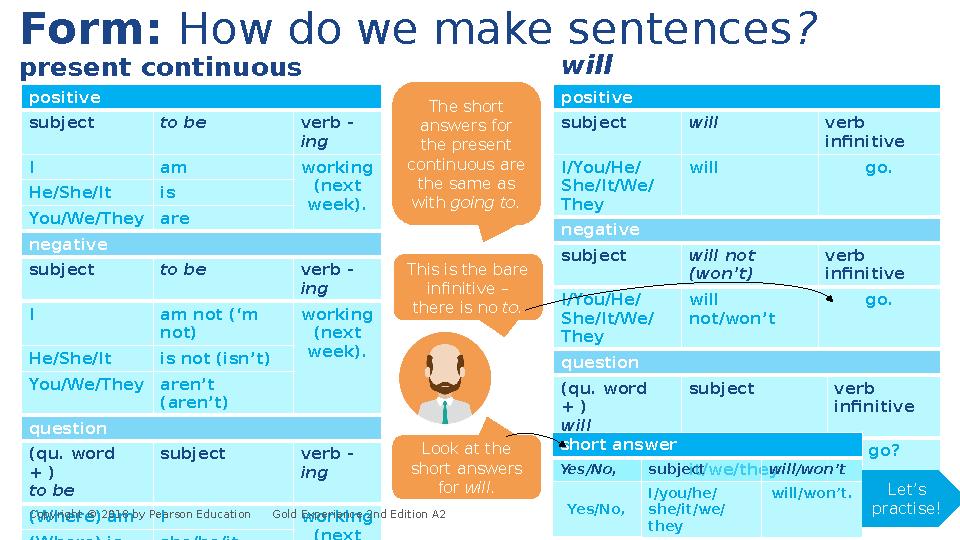
#8 слайд
Form: How do we make sentences ?
positive
subject to be verb -
ing
I am working
(next
week).
He/She/It is
You/We/They are
negative
subject to be verb -
ing
I am not (‘m
not)
working
(next
week).
He/She/It is not (isn’t)
You/We/They aren’t
(aren’t)
question
(qu. word
+ )
to be
subject verb -
ing
(Where) am I working
(next
week)?
(Where) is she/he/it
(Where) are you/we/they
present continuous
positive
subject will verb
infinitive
I/You/He/
She/It/We/
They
will go.
negative
subject will not
(won’t)
verb
infinitive
I/You/He/
She/It/We/
They
will
not/won’t
go.
question
(qu. word
+ )
will
subject verb
infinitive
(Where) will I/you/he/she/
it/we/they
go?
The short
answers for
the present
continuous are
the same as
with going to.
will
short answer
Yes/No, subject will/won’t
Yes/No,
I/you/he/
she/it/we/
they
will/won’t.
Look at the
short answers
for will. Let’s
practise!
This is the bare
infinitive –
there is no to.
Copyright © 2018 by Pearson Education Gold Experience 2nd Edition A2
8 слайд
Form: How do we make sentences ? positive subject to be verb - ing I am working (next week). He/She/It is You/We/They are negative subject to be verb - ing I am not (‘m not) working (next week). He/She/It is not (isn’t) You/We/They aren’t (aren’t) question (qu. word + ) to be subject verb - ing (Where) am I working (next week)? (Where) is she/he/it (Where) are you/we/they present continuous positive subject will verb infinitive I/You/He/ She/It/We/ They will go. negative subject will not (won’t) verb infinitive I/You/He/ She/It/We/ They will not/won’t go. question (qu. word + ) will subject verb infinitive (Where) will I/you/he/she/ it/we/they go? The short answers for the present continuous are the same as with going to. will short answer Yes/No, subject will/won’t Yes/No, I/you/he/ she/it/we/ they will/won’t. Look at the short answers for will. Let’s practise! This is the bare infinitive – there is no to. Copyright © 2018 by Pearson Education Gold Experience 2nd Edition A2
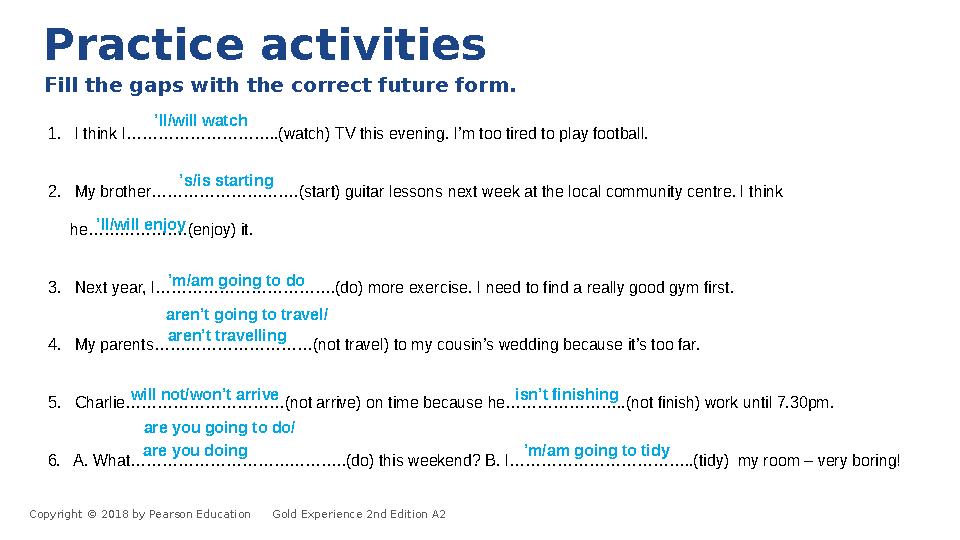
#9 слайд
1.I think I………………………..(watch) TV this evening. I’m too tired to play football.
2.My brother……………………….(start) guitar lessons next week at the local community centre. I think
he……………….(enjoy) it.
3.Next year, I…………………………….(do) more exercise. I need to find a really good gym first.
4.My parents…………………………(not travel) to my cousin’s wedding because it’s too far.
5.Charlie…………………………(not arrive) on time because he…………………..(not finish) work until 7.30pm.
6. A. What…………………………………..(do) this weekend? B. I……………………………..(tidy) my room – very boring!
Practice activities
Fill the gaps with the correct future form.
’ll/will watch
’s/is starting
’ll/will enjoy
’m/am going to do
aren’t travelling
aren’t going to travel/
will not/won’t arrive isn’t finishing
are you doing
are you going to do/
’m/am going to tidy
Copyright © 2018 by Pearson Education Gold Experience 2nd Edition A2
9 слайд
1.I think I………………………..(watch) TV this evening. I’m too tired to play football. 2.My brother……………………….(start) guitar lessons next week at the local community centre. I think he……………….(enjoy) it. 3.Next year, I…………………………….(do) more exercise. I need to find a really good gym first. 4.My parents…………………………(not travel) to my cousin’s wedding because it’s too far. 5.Charlie…………………………(not arrive) on time because he…………………..(not finish) work until 7.30pm. 6. A. What…………………………………..(do) this weekend? B. I……………………………..(tidy) my room – very boring! Practice activities Fill the gaps with the correct future form. ’ll/will watch ’s/is starting ’ll/will enjoy ’m/am going to do aren’t travelling aren’t going to travel/ will not/won’t arrive isn’t finishing are you doing are you going to do/ ’m/am going to tidy Copyright © 2018 by Pearson Education Gold Experience 2nd Edition A2

шағым қалдыра аласыз
















